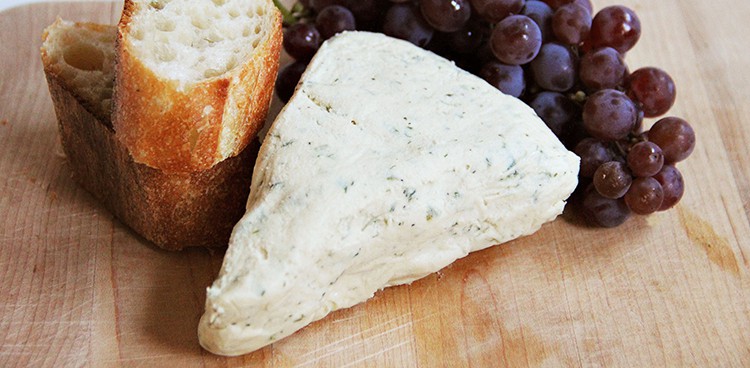
The average consumer (me) defines cheese as “delicious.” Merriam-Webster’s primary definition is somewhat more stringent—according to the dictionary, cheese is “a food consisting of the coagulated, compressed, and usually ripened curd of milk separated from the whey.” The FDA, in turn, states that said milk must be “the lacteal secretion, practically free from colostrum, obtained by the complete milking of one or more healthy cows” (or sheep or goats), putting the kibosh on the technical validity of soy, almond, rice, and coconut milk. So, craving cheese, what’s a vegan to do?
The easy answer: find an alternative. Vegan cheese production is, in principle, similar to traditional cheesemaking—proteins from non-dairy milks or butters are consolidated by lactic bacteria. The problem is that alternative milks don’t tend to produce the same kinds of complex and diverse flavors that dairy milk does. In recent years, though, as alternative diets have gained popularity, the call for more compelling vegan cheeses has grown louder, and artisan producers have begun to spring up.
Still, it’s difficult to find a vegan cheese that really satisfies. Enter Vtopian Artisan Cheeses, the second all-vegan cheese shop in the United States. Imber Lingard, an Australian vegan dismayed by the lack of non-dairy cheeses on her home continent, met Mark Jordan, an American lawyer, on Myspace (of all places) in 2008, and the pair married not long after. They started producing vegan cheese in Eugene, Ore., in 2013 and relocated to Portland two years later. There, the couple opened Vtopian’s storefront and restaurant, joining an already-booming cheese scene—Portland not only hosts an annual cheese festival but is also home to about two dozen cheesemakers and even a sushi bar–style all-cheese restaurant.
Lingard and Jordan separate themselves from the often disappointing vegan-cheese pack by closely mimicking the process of traditional dairy cheesemaking with their alternative milk products—right down to the aging, which many vegan cheesemakers forgo, believing it impossible. The two have found that a cocktail of probiotics, sauerkraut, and vegan yogurt is what gets the job done, and experimentation, more than anything else, has been the key to Vtopian’s successful development of thirty different varieties of vegan cheese—including spicy white cheddar, caramelized onion camembert, and raspberry brie.
More than just a production operation and a storefront, Vtopian also serves brunch, lunch and dinner—to vegans, lactose-intolerant folks, and omnivores alike, proving that Lingard and Jordan have really unlocked the secret to making vegan cheese that passes. Featuring their own cheeses and those of other vegan cheesemakers, the small (but expanding) menu offers vegan versions of standbys like cheesy garlic bread, caprese panini, and Caesar salad, as well as more unusual fare like a grilled mac and cheese sandwich.
Those with restricted diets and/or open minds should give Vtopian Artisan Cheeses a try on the next visit to the Pacific Northwest. The FDA might not call it cheese, but you probably will.
Feature Photo Credit: Chive and Dill Wedge courtesy Vtopia Artisan Cheeses



